维也纳外交关系公约-英文版(紧凑排版,可调整格式便于汇总整编编辑)
维也纳条约法公约中英文版之欧阳地创编

Vienna Convention on the Law of Treaties 1969维也纳条约法公约The States Parties to the present Convention,本公约各当事国,Considering the fundamental role of treaties in the history of international relations,鉴于条约在国际关系历史上之基本地位,Recognizing the ever-increasing importance of treaties as a source of international law and as a means of developing peaceful cooperation among nations, whatever their constitutional and social systems,承认条约为国际法渊源之一,且为各国间不分宪法及社会制度发展和平合作之工具,其重要性日益增加,Noting that the principles of free consent and of good faith and the pacta sunt servanda rule are universally recognized,鉴悉自由同意与善意之原则以及条约必须遵守规则及举世所承认,Affirming that disputes concerning treaties, like other international disputes, should be settled by peaceful means and in conformity with the principles of justice and international law,确认凡关于条约之争端与其他国际争端同,皆应以和平方法且依正义及国际法之原则解决之,Recalling the determination of the peoples of the United Nations to establish conditions under which justice and respect for the obligations arising from treaties can be maintained,念及联合国人民同兹决心创造适当环境俾克维持正义及尊重由条约而起之义务,Having in mind the principles of international law embodied in the Charter of the United Nations, such as the principles of the equal rights and self-determination of peoples, of the sovereign equality and independence of all States, of non-interference in the domestic affairs of States, of the prohibition of the threat or use of forceand of universal respect for, and observance of, human rights and fundamental freedoms for all,鉴及联合国宪章所载之国际法原则,诸如人民平等权利及自决,所有国家主权平等及独立,不干涉各国内政,禁止使用威胁或武力以及普遍尊重与遵守全体人类之人权及基本自由等原则。
【法律】维也纳领事关系公约 英文版
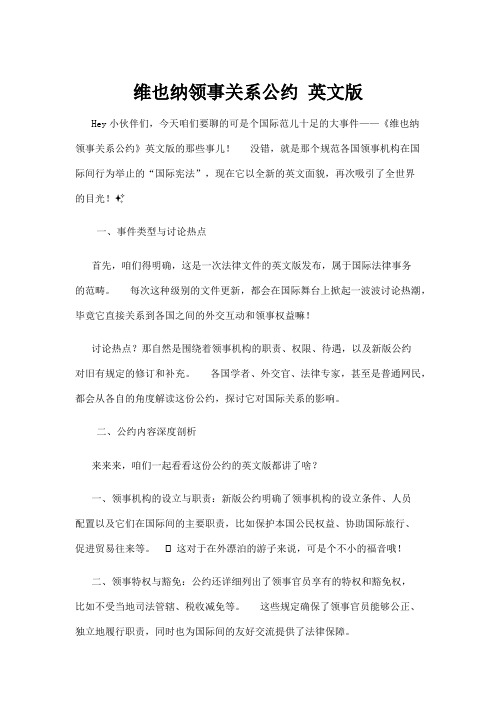
维也纳领事关系公约英文版Hey小伙伴们,今天咱们要聊的可是个国际范儿十足的大事件——《维也纳领事关系公约》英文版的那些事儿! 没错,就是那个规范各国领事机构在国际间行为举止的“国际宪法”,现在它以全新的英文面貌,再次吸引了全世界的目光!✨一、事件类型与讨论热点首先,咱们得明确,这是一次法律文件的英文版发布,属于国际法律事务的范畴。
每次这种级别的文件更新,都会在国际舞台上掀起一波波讨论热潮,毕竟它直接关系到各国之间的外交互动和领事权益嘛!讨论热点?那自然是围绕着领事机构的职责、权限、待遇,以及新版公约对旧有规定的修订和补充。
各国学者、外交官、法律专家,甚至是普通网民,都会从各自的角度解读这份公约,探讨它对国际关系的影响。
二、公约内容深度剖析来来来,咱们一起看看这份公约的英文版都讲了啥?一、领事机构的设立与职责:新版公约明确了领事机构的设立条件、人员配置以及它们在国际间的主要职责,比如保护本国公民权益、协助国际旅行、促进贸易往来等。
⚖️这对于在外漂泊的游子来说,可是个不小的福音哦!二、领事特权与豁免:公约还详细列出了领事官员享有的特权和豁免权,比如不受当地司法管辖、税收减免等。
这些规定确保了领事官员能够公正、独立地履行职责,同时也为国际间的友好交流提供了法律保障。
三、争议解决机制:当然啦,国际间的交往难免会有摩擦和争议。
新版公约也对此进行了详细规定,设立了争议解决机制,包括协商、调解、仲裁等多种方式,力求在平等、互利的基础上解决分歧。
三、引发思考与国际影响这份公约的英文版发布,不仅是对原有文本的翻译和更新,更是对国际关系的一次深刻反思和重塑。
一方面,它体现了国际社会对于领事关系的重视和尊重,为各国领事机构提供了更加明确、具体的法律指导。
另一方面,它也促使各国在领事事务上更加透明、公正,有助于减少误解和冲突,促进国际间的和谐与合作。
更重要的是,随着全球化的不断深入,领事关系的重要性日益凸显。
维也纳条约法公约中英文版之欧阳德创编
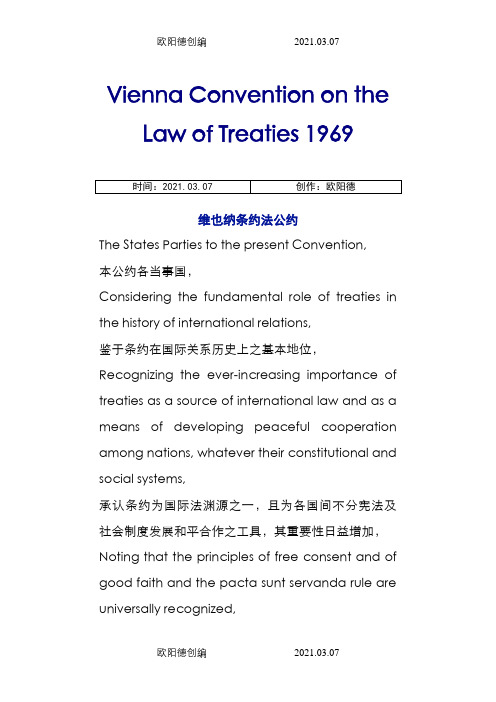
Vienna Convention on the Law of Treaties 1969维也纳条约法公约The States Parties to the present Convention,本公约各当事国,Considering the fundamental role of treaties in the history of international relations,鉴于条约在国际关系历史上之基本地位,Recognizing the ever-increasing importance of treaties as a source of international law and as a means of developing peaceful cooperation among nations, whatever their constitutional and social systems,承认条约为国际法渊源之一,且为各国间不分宪法及社会制度发展和平合作之工具,其重要性日益增加,Noting that the principles of free consent and of good faith and the pacta sunt servanda rule are universally recognized,鉴悉自由同意与善意之原则以及条约必须遵守规则及举世所承认,Affirming that disputes concerning treaties, like other international disputes, should be settled by peaceful means and in conformity with the principles of justice and international law,确认凡关于条约之争端与其他国际争端同,皆应以和平方法且依正义及国际法之原则解决之,Recalling the determination of the peoples of the United Nations to establish conditions under which justice and respect for the obligations arising from treaties can be maintained,念及联合国人民同兹决心创造适当环境俾克维持正义及尊重由条约而起之义务,Having in mind the principles of international law embodied in the Charter of the United Nations, such as the principles of the equal rights and self-determination of peoples, of the sovereign equality and independence of all States, of non-interference in the domestic affairs of States, of the prohibition of the threat or use of force and ofuniversal respect for, and observance of, human rights and fundamental freedoms for all,鉴及联合国宪章所载之国际法原则,诸如人民平等权利及自决,所有国家主权平等及独立,不干涉各国内政,禁止使用威胁或武力以及普遍尊重与遵守全体人类之人权及基本自由等原则。
维也纳条约法公约中英文版之欧阳术创编
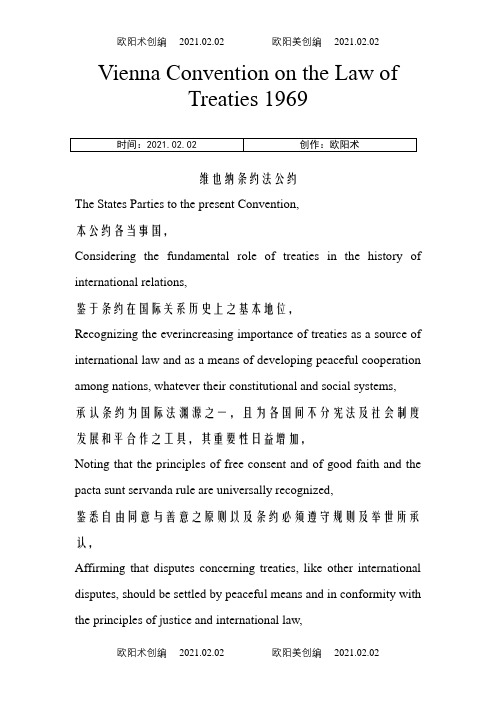
Vienna Convention on the Law ofTreaties 1969维也纳条约法公约The States Parties to the present Convention,本公约各当事国,Considering the fundamental role of treaties in the history of international relations,鉴于条约在国际关系历史上之基本地位,Recognizing the everincreasing importance of treaties as a source of international law and as a means of developing peaceful cooperation among nations, whatever their constitutional and social systems,承认条约为国际法渊源之一,且为各国间不分宪法及社会制度发展和平合作之工具,其重要性日益增加,Noting that the principles of free consent and of good faith and the pacta sunt servanda rule are universally recognized,鉴悉自由同意与善意之原则以及条约必须遵守规则及举世所承认,Affirming that disputes concerning treaties, like other international disputes, should be settled by peaceful means and in conformity with the principles of justice and international law,确认凡关于条约之争端与其他国际争端同,皆应以和平方法且依正义及国际法之原则解决之,Recalling the determination of the peoples of the United Nations to establish conditions under which justice and respect for the obligations arising from treaties can be maintained,念及联合国人民同兹决心创造适当环境俾克维持正义及尊重由条约而起之义务,Having in mind the principles of international law embodied in the Charter of the United Nations, such as the principles of the equal rights and selfdetermination of peoples, of the sovereign equality and independence of all States, of noninterference in the domestic affairs of States, of the prohibition of the threat or use of force and of universal respect for, and observance of, human rights and fundamental freedoms for all,鉴及联合国宪章所载之国际法原则,诸如人民平等权利及自决,所有国家主权平等及独立,不干涉各国内政,禁止使用威胁或武力以及普遍尊重与遵守全体人类之人权及基本自由等原则。
维也纳条约法公约中英文版之欧阳计创编
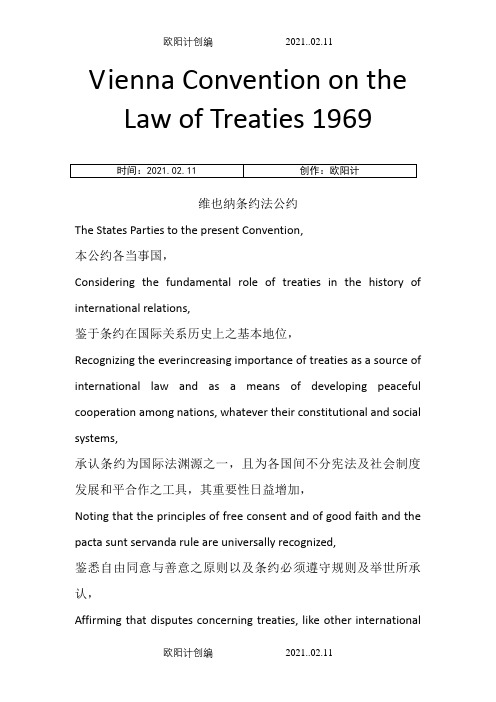
Vienna Convention on the Law of Treaties 1969维也纳条约法公约The States Parties to the present Convention,本公约各当事国,Considering the fundamental role of treaties in the history ofinternational relations,鉴于条约在国际关系历史上之基本地位,Recognizing the everincreasing importance of treaties as a source ofinternational law and as a means of developing peacefulcooperation among nations, whatever their constitutional and socialsystems,承认条约为国际法渊源之一,且为各国间不分宪法及社会制度发展和平合作之工具,其重要性日益增加,Noting that the principles of free consent and of good faith and thepacta sunt servanda rule are universally recognized,鉴悉自由同意与善意之原则以及条约必须遵守规则及举世所承认,Affirming that disputes concerning treaties, like other internationaldisputes, should be settled by peaceful means and in conformity with the principles of justice and international law,确认凡关于条约之争端与其他国际争端同,皆应以和平方法且依正义及国际法之原则解决之,Recalling the determination of the peoples of the United Nations to establish conditions under which justice and respect for the obligations arising from treaties can be maintained,念及联合国人民同兹决心创造适当环境俾克维持正义及尊重由条约而起之义务,Having in mind the principles of international law embodied in the Charter of the United Nations, such as the principles of the equal rights and selfdetermination of peoples, of the sovereign equality and independence of all States, of noninterference in the domestic affairs of States, of the prohibition of the threat or use of force and of universal respect for, and observance of, human rights and fundamental freedoms for all,鉴及联合国宪章所载之国际法原则,诸如人民平等权利及自决,所有国家主权平等及独立,不干涉各国内政,禁止使用威胁或武力以及普遍尊重与遵守全体人类之人权及基本自由等原则。
维也纳条约法公约中英文版之欧阳生创编

Vienna Convention on the Law of Treaties 1969维也纳条约法公约The States Parties to the present Convention,本公约各当事国,Considering the fundamental role of treaties in the history of international relations,鉴于条约在国际关系历史上之基本地位,Recognizing the everincreasing importance of treaties as a source of international law and as a means of developing peaceful cooperation among nations, whatever their constitutional and social systems,承认条约为国际法渊源之一,且为各国间不分宪法及社会制度发展和平合作之工具,其重要性日益增加,Noting that the principles of free consent and of good faith and the pacta sunt servanda rule are universally recognized,鉴悉自由同意与善意之原则以及条约必须遵守规则及举世所承认,Affirming that disputes concerning treaties, like other international disputes, should be settled by peaceful means and in conformitywith the principles of justice and international law,确认凡关于条约之争端与其他国际争端同,皆应以和平方法且依正义及国际法之原则解决之,Recalling the determination of the peoples of the United Nations to establish conditions under which justice and respect for the obligations arising from treaties can be maintained,念及联合国人民同兹决心创造适当环境俾克维持正义及尊重由条约而起之义务,Having in mind the principles of international law embodied in the Charter of the United Nations, such as the principles of the equal rights and selfdetermination of peoples, of the sovereign equality and independence of all States, of noninterference in the domestic affairs of States, of the prohibition of the threat or use of force and of universal respect for, and observance of, human rights and fundamental freedoms for all,鉴及联合国宪章所载之国际法原则,诸如人民平等权利及自决,所有国家主权平等及独立,不干涉各国内政,禁止使用威胁或武力以及普遍尊重与遵守全体人类之人权及基本自由等原则。
维也纳外交关系公约
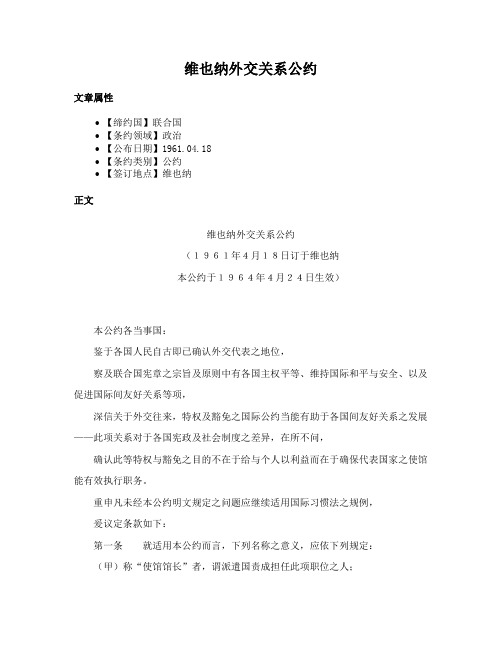
维也纳外交关系公约文章属性•【缔约国】联合国•【条约领域】政治•【公布日期】1961.04.18•【条约类别】公约•【签订地点】维也纳正文维也纳外交关系公约(1961年4月18日订于维也纳本公约于1964年4月24日生效)本公约各当事国:鉴于各国人民自古即已确认外交代表之地位,察及联合国宪章之宗旨及原则中有各国主权平等、维持国际和平与安全、以及促进国际间友好关系等项,深信关于外交往来,特权及豁免之国际公约当能有助于各国间友好关系之发展——此项关系对于各国宪政及社会制度之差异,在所不问,确认此等特权与豁免之目的不在于给与个人以利益而在于确保代表国家之使馆能有效执行职务。
重申凡未经本公约明文规定之问题应继续适用国际习惯法之规例,爰议定条款如下:第一条就适用本公约而言,下列名称之意义,应依下列规定:(甲)称“使馆馆长”者,谓派遣国责成担任此项职位之人;(乙)称“使馆人员”者,谓使馆馆长及使馆职员;(丙)称“使馆职员”者,谓使馆外交职员、行政及技术职员,及事务职员;(丁)称“外交职员”者,谓具有外交官级位之使馆职员;(戊)称“外交代表”者,谓使馆馆长或使馆外交职员;(己)称“行政及技术职员”者,谓承办使馆行政及技术事务之使馆职员;(庚)称“事务职员”者,谓为使馆仆役之使馆职员;(辛)称“私人仆役”者,谓充使馆人员佣仆而非为派遣国雇用之人;(壬)称“使馆馆舍”者,谓供使馆使用及供使馆馆长寓邸之用之建筑物或建筑物之各部分,以及其所附属之土地,至所有权谁属,则在所不问。
第二条国与国间外交关系及常设使馆之建立,以协议为之。
第三条一、除其他事项外,使馆之职务如下:(甲)在接受国中代表派遣国;(乙)于国际法许可之限度内,在接受国中保护派遣国及其国民之利益;(丙)与接受国政府办理交涉;(丁)以一切合法手段调查接受国之状况及发展情形,向派遣国政府具报;(戊)促进派遣国与接受国间之友好关系,及发展两国间之经济、文化与科学关系。
【法律】维也纳领事关系公约 英文版
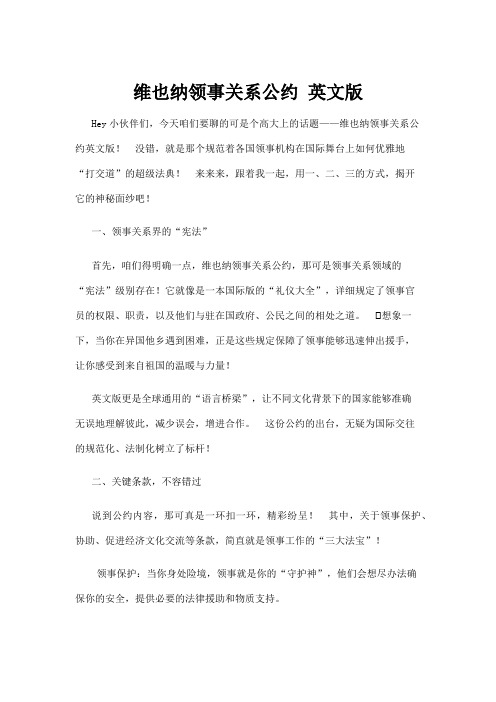
维也纳领事关系公约英文版Hey小伙伴们,今天咱们要聊的可是个高大上的话题——维也纳领事关系公约英文版! 没错,就是那个规范着各国领事机构在国际舞台上如何优雅地“打交道”的超级法典! 来来来,跟着我一起,用一、二、三的方式,揭开它的神秘面纱吧!一、领事关系界的“宪法”首先,咱们得明确一点,维也纳领事关系公约,那可是领事关系领域的“宪法”级别存在!它就像是一本国际版的“礼仪大全”,详细规定了领事官员的权限、职责,以及他们与驻在国政府、公民之间的相处之道。
⚖️想象一下,当你在异国他乡遇到困难,正是这些规定保障了领事能够迅速伸出援手,让你感受到来自祖国的温暖与力量!英文版更是全球通用的“语言桥梁”,让不同文化背景下的国家能够准确无误地理解彼此,减少误会,增进合作。
这份公约的出台,无疑为国际交往的规范化、法制化树立了标杆!二、关键条款,不容错过说到公约内容,那可真是一环扣一环,精彩纷呈! 其中,关于领事保护、协助、促进经济文化交流等条款,简直就是领事工作的“三大法宝”!领事保护:当你身处险境,领事就是你的“守护神”,他们会想尽办法确保你的安全,提供必要的法律援助和物质支持。
领事协助:无论是办理证件、传递信息,还是提供咨询,领事都是你最贴心的“小助手”。
促进经济文化交流:领事还是文化交流的使者,他们通过组织活动、搭建平台,让不同国家的文化得以相互了解、相互借鉴。
英文版公约更是将这些条款翻译得精准无误,让全球读者都能轻松get到其中的精髓!三、影响深远,未来可期维也纳领事关系公约英文版的发布,不仅是对现有领事关系的一次全面梳理和总结,更是对未来国际交往格局的深远布局。
它鼓励各国在平等、尊重的基础上开展领事合作,共同应对全球化带来的挑战和机遇。
随着全球化的不断深入,领事工作的重要性日益凸显。
未来,我们有理由相信,在维也纳领事关系公约的指引下,各国领事机构将更加紧密地携手合作,共同维护国际社会的和平与稳定,推动人类文明的进步与发展!好啦,说了这么多,是不是已经迫不及待想要了解更多关于维也纳领事关系公约英文版的内容了呢? 别急别急,网上资源多得是,赶紧去找找看吧!记得回来跟我分享你的学习心得哦!最后,我想说,虽然这份公约听起来有些“高冷”,但它其实与我们每个人的生活都息息相关。
- 1、下载文档前请自行甄别文档内容的完整性,平台不提供额外的编辑、内容补充、找答案等附加服务。
- 2、"仅部分预览"的文档,不可在线预览部分如存在完整性等问题,可反馈申请退款(可完整预览的文档不适用该条件!)。
- 3、如文档侵犯您的权益,请联系客服反馈,我们会尽快为您处理(人工客服工作时间:9:00-18:30)。
维也纳外交关系公约英文版VIENNA CONVENTION ON DIPLOMATIC RELATIONS AND OPTIONAL PROTOCOLS Vienna Convention on Diplomatic Relations. Done at Vienna, on 18 April 1961The States Parties to the present Convention,Recalling that peoples of all nations from ancient times have recognized the status of diplomatic agents,Having in mind the purposes and principles of the Charter of the United Nations concerning the sovereign equality of States, the maintenance of international peace and security, and the promotion of friendly relations among nations,Believing that an international convention on diplomatic intercourse, privileges and immunities would contribute to the development of friendly relations among nations, irrespective of their differing constitutional and social systems,Realizing that the purpose of such privileges and immunities is not to benefit individuals but to ensure the efficient performance of the functions of diplomatic missions as representing States, Affirming that the rules of customary international law should continue to govern questions not expressly regulated by the provisions of the present Convention,Have agreed as follows:Article IFor the purpose of the present Convention, the following expressions shall have the meanings hereunder assigned to them:(a) The "head of the mission" is the person charged by the sending State with the duty of acting in that capacity;(b) The "members of the mission" are the head of the mission and the members of the staff of the mission;(c) The "members of the staff of the mission" are the members of the diplomatic staff, of the administrative and technical staff and of the service staff of the mission;(d) The "members of the diplomatic staff" are the members of the staff of the mission having diplomatic rank;(e) A "diplomatic agent" is the head of the mission or a member of the diplomatic staff of the mission;(f) The "members of the administrative and technical staff" are the members of the staff of the mission employed in the administrative and technical service of the mission;(g) The "members of the service staff" are the members of the staff of the mission in the domestic service of the mission;(h) A "private servant" is a person who is in the domestic service of a member of the mission and who is not an employee of the sending State;(i) The "premises of the mission" are the buildings or parts of buildings and the land ancillary thereto, irrespective of ownership, used for the purposes of the mission including the residence of the head of the mission.Article 2The establishment of diplomatic relations between States, and of permanent diplomatic missions, takes place by mutual consent.Article 31. The functions of a diplomatic mission consist, inter alia, in:(a) Representing the sending State in the receiving State;(b) Protecting in the receiving State the interests of the sending State and of its nationals, within the limits permitted by international law;(c) Negotiating with the Government of the receiving State;(d) Ascertaining by all lawful means conditions and developments in the receiving State, and reporting thereon to the Government of the sending State;(e) Promoting friendly relations between the sending State and the receiving State, and developing their economic, cultural and scientific relations;2. Nothing in the present Convention shall be construed as preventing the performance of consular functions by a diplomatic mission.Article 41. The sending State must make certain that the agreement of the receiving State has been given for the person it proposes to accredit as head of the mission to that State.2. The receiving State is not obliged to give reasons to the sending State for a refusal of agreement.Article 51. The sending State may, after it has given due notification to the receiving States concerned, accredit a head of mission or assign any member of the diplomatic staff, as the case may be, to more than one State, unless there is express objection by any of the receiving States.2. If the sending State accredits a head of mission to one or more other States it may establish a diplomatic mission headed by a charg?d'affaires ad interim in each State where the head of mission has not his permanent seat.3. A head of mission or any member of the diplomatic staff of the mission may act as representative of the sending State to any international organization.Article 6Two or more States may accredit the same person as head of mission to another State, unless objection is offered by the receiving State.Article 7Subject to the provisions of articles 5, 8, 9 and 11, the sending State may freely appoint the members of the staff of the mission. In the case of military, naval or air attach閟, the receiving State may require their names to be submitted beforehand, for its approval.Article 81. Members of the diplomatic staff of the mission should in principle be of the nationality of the sending State.2. Members of the diplomatic staff of the mission may not be appointed from among persons having the nationality of the receiving State, except with the consent of that State which may be withdrawn at any time.3. The receiving State may reserve the same right with regard to nationals of a third State who are not also nationals of the sending State.Article 91. The receiving State may at any time and without having to explain its decision, notify the sending State that the head of the mission or any member of the diplomatic staff of the mission is persona non grata or that any other member of the staff of the mission is not acceptable. In any such case, the sending State shall, as appropriate, either recall the person concerned or terminate his functions with the mission. A person may be declared non grata or not acceptable before arriving in the territory of the receiving State.2. If the sending State refuses or fails within a reasonable period to carry out its obligations under paragraph 1 of this article, the receiving State may refuse to recognize the person concerned as a member of the mission.Article 101. The Ministry for Foreign Affairs of the receiving State, or such other ministry as may be agreed, shall be notified of:(a) The appointment of members of the mission, their arrival and their final departure or the termination of their functions with the mission;(b) The arrival and final departure of a person belonging to the family of a member of the mission and, where appropriate, the fact that a person becomes or ceases to be a member of the family of a member of the mission;(c) The arrival and final departure of private servants in the employ of persons referred to in sub-paragraph (a) of this paragraph and, where appropriate, the fact that they are leaving the employ of such persons;(d) The engagement and discharge of persons resident in the receiving State as members of the mission or private servants entitled to privileges and immunities.2. Where possible, prior notification of arrival and final departure shall also be given.Article 111. In the absence of specific agreement as to the size of the mission, the receiving State may require that the size of a mission be kept within limits considered by it to be reasonable and normal, having regard to circumstances and conditions in the receiving State and to the needs of the particular mission.2. The receiving State may equally, within similar bounds and on a non-discriminatory basis, refuse to accept officials of a particular category.Article 12The sending State may not, without the prior express consent of the receiving State, establish offices forming part of the mission in localities other than those in which the mission itself is established.Article 131. The head of the mission is considered as having taken up his functions in the receiving State either when he has presented his credentials or when he has notified his arrival and a true copy of his credentials has been presented to the Ministry for Foreign Affairs of the receiving State, or such other ministry as may be agreed, in accordance with the practice prevailing in the receiving State which shall be applied in a uniform manner.2. The order of presentation of credentials or of a true copy thereof will be determined by the date and time of the arrival of the head of the mission.Article 141. Heads of mission are divided into three classes - namely:(a) That of ambassadors or nuncios accredited to Heads of State, and other heads of mission of equivalent rank;(b) That of envoys, ministers and internuncios accredited to Heads of State:(c) That of charg閟d' affaires accredited to Ministers for Foreign Affairs.2. Except as concerns precedence and etiquette, there shall be no differentiation between heads of mission by reason of their class.Article 15The class to which the heads of their missions are to be assigned shall be agreed between States.Article 161. Heads of mission shall take precedence in their respective classes in the order of the date and time of taking up their functions in accordance with article 13.2. Alterations in the credentials of a head of mission not involving any change of class shall not affect his precedence.3. This article is without prejudice to any practice accepted by the receiving State regarding the precedence of the representative of the Holy See.Article 17The precedence of the members of the diplomatic staff of the mission shall be notified by the head of the mission to the Ministry for Foreign Affairs or such other ministry as may be agreed.Article 18The procedure to be observed in each State for the reception of heads of mission shall be uniform in respect of each class.Article 191. If the post of head of the mission is vacant, or if the head of the mission is unable to perform his functions a charg?d'affaires ad interim shall act provisionally as head of the mission. The name of the charg?d'affaires ad interim shall be notified, either by the head of the mission or in case he is unable to do so, by the Ministry for Foreign Affairs of the sending State to the Ministry for Foreign Affairs of the receiving State or such other ministry as may be agreed.2. In cases where no member of the diplomatic staff of the mission is present in the receiving State, a member of the administrative and technical staff may, with the consent of the receiving State, be designated by the sending State to be in charge of the current administrative affairs of the mission.Article 20The mission and its head shall have the right to use the flag and emblem of the sending State on the premises of the mission, including the residence of the head of the mission, and on his means of transport.Article 211. The receiving State shall either facilitate the acquisition on its territory, in accordance with its laws, by the sending State of premises necessary for its mission or assist the latter in obtaining accommodation in some other way.2. It shall also, where necessary, assist missions in obtaining suitable accommodation for their members.Article 221. The premises of the mission shall be inviolable. The agents of the receiving State may not enter them, except with the consent of the head of the mission.2. The receiving State is under a special duty to take all appropriate steps to protect the premises of the mission against any intrusion or damage and to prevent any disturbance of the peace of the mission or impairment of its dignity.3. The premises of the mission, their furnishings and other property thereon and the means of transport of the mission shall be immune from search, requisition, attachment or execution.Article 231. The sending State and the head of the mission shall be exempt from all national, regional or municipal dues and taxes in respect of the premises of the mission, whether owned or leased, other than such as represent payment for specific services rendered.2. The exemption from taxation referred to in this article shall not apply to such dues and taxes payable under the law of the receiving State by persons contracting with the sending State or the head of the mission.Article 24The archives and documents of the mission shall be inviolable at any time and wherever they may be.Article 25The receiving State shall accord full facilities for the performance of the functions of the mission.Article 26Subject to its laws and regulations concerning zones entry into which is prohibited or regulated for reasons of national security, the receiving State shall ensure to all members of the mission freedom of movement and travel in its territory.Article 271. The receiving State shall permit and protect free communication on the part of the mission for all official purposes. In communicating with the Government and the other missions and consulates of the sending States, wherever situated, the mission may employ all appropriate means, including diplomatic couriers and messages in code or cipher. However, the mission may install and use a wireless transmitter only with the consent of the receiving State.2. The official correspondence of the mission shall be inviolable. Official correspondence means all correspondence relating to the mission and its functions.3. The diplomatic bag shall not be opened or detained.4. The packages constituting the diplomatic bag must bear visible external marks of their character and may contain only diplomatic documents or articles intended for official use.5. The diplomatic courier, who shall be provided with an official document indicating his status and the number of packages constituting the diplomatic bag, shall be protected by the receiving State in the performance of his functions. He shall enjoy personal inviolability and shall not be liable to any form of arrest or detention.6. The sending State or mission may designate diplomatic couriers ad hoc. In such cases the provisions of paragraph 5 of this article shall also apply, except that the immunities therein mentioned shall cease to apply when such a courier has delivered to the consignee the diplomatic bag in his charge.7. A diplomatic bag may be entrusted to the captain of a commercial aircraft scheduled to land at an authorized port of entry. He shall be provided with an official document indicating the number of packages constituting the bag but he shall not be considered to be a diplomatic courier. The mission may send one of its members to take possession of the diplomatic bag directly and freely from the captain of the aircraft.Article 28The fees and charges levied by the mission in the course of its official duties shall be exempt from all dues and taxes.Article 29The person of a diplomatic agent shall be inviolable. He shall not be liable to any form of arrest or detention. The receiving State shall treat him with due respect and shall take all appropriate steps to prevent any attack on his person, freedom or dignity.Article 301. The private residence of a diplomatic agent shall enjoy the same inviolability and protection as the premises of the mission.2. His papers, correspondence and, except as provided in paragraph 3 of article 31, his property, shall likewise enjoy inviolability.Article 311. A diplomatic agent shall enjoy immunity from the criminal jurisdiction of the receiving State. He shall also enjoy immunity from its civil and administrative jurisdiction, except in the case of: (a) A real action relating to private immovable property situated in the territory of the receiving State, unless he holds it on behalf of the sending State for the purposes of the mission;(b) An action relating to succession in which the diplomatic agent is involved as executor, administrator, heir or legatee as a private person and not on behalf of the sending State;(c) An action relating to any professional or commercial activity exercised by the diplomatic agent in the receiving State outside his official functions.2. A diplomatic agent is not obliged to give evidence as a witness.3. No measures of execution may be taken in respect of a diplomatic agent except in the cases coming under sub-paragraphs (a), (b) and (c) of paragraph 1 of this article, and provided that the measures concerned can be taken without infringing the inviolability of his person or of his residence.4. The immunity of a diplomatic agent from the jurisdiction of the State does not exempt him from the jurisdiction of the sending State.Article 321. The immunity from jurisdiction of diplomatic agents and of persons enjoying immunity under article 37 may be waived by the sending State.2. Waiver must always be express.3. The initiation of proceedings by a diplomatic agent or by a person enjoying immunity from jurisdiction under article 37 shall preclude him from invoking immunity from jurisdiction in respect of any counter-claim directly connected with the principal claim.4. Waiver of immunity from jurisdiction in respect of civil or administrative proceedings shall not be held to imply waiver of immunity in respect of the execution of the judgement, for which a separate waiver shall be necessary.Article 331. Subject to the provisions of Paragraph 3 of this article, a diplomatic agent shall with respect to services rendered for the sending State be exempt from social security provisions which may be in force in the receiving State.2. The exemption provided for in Paragraph 1 of this article shall also apply to private servants who are in the sole employ of a diplomatic agent, on condition:(a) That they are not nationals of or permanently resident in the receiving State; and(b) That they are covered by the social security provisions which may be in force in the sending State or a third State.3. A diplomatic agent who employs persons to whom the exemption provided for in paragraph 2 of this article does not apply shall observe the obligations which the social security provisions of the receiving State impose upon employers.4. The exemption provided for in paragraphs 1 and 2 of this article shall not preclude voluntary participation in the social security system of the receiving State provided that such participation is permitted by that State.5. The provisions of this article shall not affect bilateral or multilateral agreements concerning social security concluded previously and shall not prevent the conclusion of such agreements in the future.Article 34A diplomatic agent shall be exempt from all dues and taxes, personal or real, national, regional or municipal except:(a) Indirect taxes of a kind which are normally incorporated in the price of goods or services;(b) Dues and taxes on private immovable property situated in the territory of the receiving State, unless he holds it on behalf of the sending State for the purposes of the mission;(c) Estate, succession or inheritance duties levied by the receiving State, subject to the provisions of paragraph 4 of article 39;(d) Dues and taxes on private income having its source in the receiving State and capital taxes on investments made in commercial undertakings in the receiving State;(e) Charges levied for specific services rendered;(f) Registration, court or record fees, mortgage dues and stamp duty, with respect to immovable property, subject to the provisions of article 23.Article 35The receiving State shall exempt diplomatic agents from all personal services, from all public service of any kind whatsoever, and from military obligations such as those connected with requisitioning, military contributions and billeting.Article 361. The receiving State shall, in accordance with such laws and regulations as it may adopt, permit entry of and grant exemption from all customs duties, taxes, and related charges other than charges for storage, cartage and similar services, on:(a) Articles for the official use of the mission;(b) Articles for the personal use of a diplomatic agent or members of his family forming part of his household, including articles intended for his establishment.2. The personal baggage of a diplomatic agent shall be exempt from inspection, unless there are serious grounds for presuming that it contains articles not covered by the exemptions mentioned in paragraph 1 of this article, or articles the import or export of which is prohibited by the law or controlled by the quarantine regulations of the receiving State. Such inspection shall be conducted only in the presence of the diplomatic agent or of his authorized representative.Article 371. The members of the family of a diplomatic agent forming part of his household shall, if they are not nationals of the receiving State, enjoy the privileges and immunities specified in articles 29 to 36.2. Members of the administrative and technical staff of the mission, together with members of their families forming part of their respective households, shall, if they are not nationals of or permanently resident in the receiving State, enjoy the privileges and immunities specified in articles 29 to 35, except that the immunity from civil and administrative jurisdiction of thereceiving State specified in paragraph 1 of article 31 shall not extend to acts performed outside the course of their duties. They shall also enjoy the privileges specified in article 36, paragraph 1, in respect of articles imported at the time of first installation.3. Members of the service staff of the mission who are not nationals of or permanently resident in the receiving State shall enjoy immunity in respect of acts performed in the course of their duties, exemption from dues and taxes on the emoluments they receive by reason of their employment and the exemption contained in article 33.4. Private servants of members of the mission shall, if they are not nationals of or permanently resident in the receiving State, be exempt from dues and taxes on the emoluments they receive by reason of their employment. In other respects, they may enjoy privileges and immunities only to the extent admitted by the receiving State. However, the receiving State must exercise its jurisdiction over those persons in such a manner as not to interfere unduly with the performance of the functions of the mission.Article 381. Except in so far as additional privileges and immunities may be granted by the receiving State, a diplomatic agent who is a national of or permanently resident in that State shall enjoy only immunity from jurisdiction, and inviolability, in respect of official acts performed in the exercise of his functions.2. Other members of the staff of the mission and private servants who are nationals of or permanently resident in the receiving State shall enjoy privileges and immunities only to the extent admitted by the receiving State. However, the receiving State must exercise itsjurisdiction over those persons in such a manner as not to interfere unduly with the performance of the functions of the mission.Article 391. Every person entitled to privileges and immunities shall enjoy them from the moment he enters the territory of the receiving State on proceeding to take up his post or, if already in its territory, from the moment when his appointment is notified to the Ministry for Foreign Affairs or such other ministry as may be agreed.2. When the functions of a person enjoying privileges and immunities have come to an end, such privileges and immunities shall normally cease at the moment when he leaves the country, or on expiry of a reasonable period in which to do so, but shall subsist until that time, even in case of armed conflict. However, with respect to acts performed by such a person in the exercise of his functions as a member of the mission, immunity shall continue to subsist.3. In case of the death of a member of the mission, the members of his family shall continue to enjoy the privileges and immunities to which they are entitled until the expiry of a reasonable period in which to leave the country.4. In the event of the death of a member of the mission not a national of or permanently resident in the receiving State or a member of his family forming part of his household, the receiving State shall permit the withdrawal of the movable property of the deceased, with the exception of any property acquired in the country the export of which was prohibited at the time of his death. Estate, succession and inheritance duties shall not be levied on movable property the presence of which in the receiving State was due solely to the presence there ofthe deceased as a member of the mission or as a member of the family of a member of the mission.Article 401. If a diplomatic agent passes through or is in the territory of a third State, which has granted him a passport visa if such visa was necessary, while proceeding to take up or to return to his post, or when returning to his own country, the third State shall accord him inviolability and such other immunities as may be required to ensure his transit or return. The same shall apply in the case of any members of his family enjoying privileges or immunities who are accompanying the diplomatic agent, or travelling separately to join him or to return to their country.2. In circumstances similar to those specified in paragraph 1 of this article, third States shall not hinder the passage of members of the administrative and technical or service staff of a mission, and of members of their families, through their territories.3. Third States shall accord to official correspondence and other official communications in transit, including messages in code or cipher, the same freedom and protection as is accorded by the receiving State. They shall accord to diplomatic couriers, who have been granted a passport visa if such visa was necessary, and diplomatic bags in transit the same inviolability and protection as the receiving State is bound to accord.4. The obligations of third States under paragraphs 1, 2 and 3 of this article shall also apply to the persons mentioned respectively in those paragraphs, and to official communications and diplomatic bags, whose presence in the territory of the third State is due to force majeure.Article 411. Without prejudice to their privileges and immunities, it is the duty of all persons enjoying such privileges and immunities to respect the laws and regulations of the receiving State. They also have a duty not to interfere in the internal affairs of that State.2. All official business with the receiving State entrusted to the mission by the sending State shall be conducted with or through the Ministry for Foreign Affairs of the receiving State or such other ministry as may be agreed.3. The premises of the mission must not be used in any manner incompatible with the functions of the mission as laid down in the present Convention or by other rules of general international law or by any special agreements in force between the sending and the receiving State.Article 42A diplomatic agent shall not in the receiving State practise for personal profit any professional or commercial activity.Article 43The function of a diplomatic agent comes to an end, inter alia:(a) On notification by the sending State to the receiving State that the function of the diplomatic agent has come to an end;(b) On notification by the receiving State to the sending State that, in accordance with paragraph 2 of article 9, it refuses to recognize the diplomatic agent as a member of the mission.Article 44The receiving State must, even in case of armed conflict, grant facilities in order to enable persons enjoying privileges and immunities, other than nationals of the receiving State, and members of the families of such persons irrespective of their nationality, to leave at the earliest possible moment. It must, in particular, in case of need, place at their disposal the nedcessary means of transport for themselves and their property.Article 45If diplomatic relations are broken off between two States, or if a mission is permanently or temporarily recalled:(a) The receiving State must, even in case of armed conflict, respect and protect the premises of the mission, together with its property and archives;(b) The sending State may entrust the custody of the premises of the mission, together with its property and archives, to a third State acceptable to the receiving State;(c) The sending State may entrust the protection of its interests and those of its nationals to a third State acceptable to the receiving State.Article 46。
